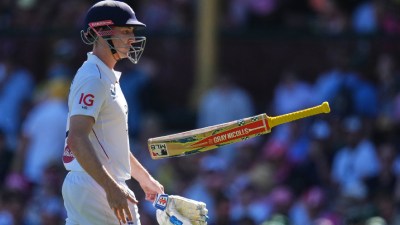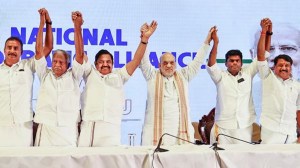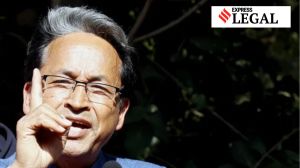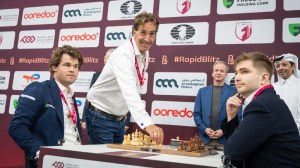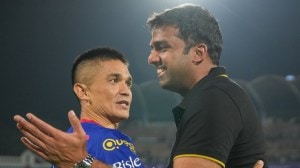West let Pak down, says Sharif
LONDON, FEBRUARY 28: Nawaz Sharif says that the West is culpable in the over-throw of democracy in Pakistan. The ousted Pakistani prime mi...

LONDON, FEBRUARY 28: Nawaz Sharif says that the West is culpable in the over-throw of democracy in Pakistan. The ousted Pakistani prime minister has told the Sunday Telegraph newspaper: quot;I am extremely disappointed that the preachers of democracy in the Western world are acquiescing in the one-man dictatorial rule. They are indirectly supporting the destruction of democracy in Pakistan.quot;
The Sunday Telegraph claimed that the comments were part of written replies from Sharif to question from the paper8217;s correspondent Christina Lamb. The paper said that the deposed prime minister8217;s replies were smuggled out by an intermediary in his cell at Karachi fort. In the interview8217;, Sharif asserted that he did not regret trying to sack General Musharraf, and his confidence has been boosted by the refusal of six Supreme Court judges to take an oath of allegiance to the provisional constitutional order drawn up by the military.
According to the paper Sharif was particularly angered by a personal letter that British Prime Minister Tony Blair had recently written to Gen Pervez Musharraf, expressing quot;understandingquot; of the situation in Pakistan. Sharif is reported to have be troubled by the increasing international acceptance of the Musharraf regime. He asks: quot;How can any civilised country or democratically elected government accept an illegal and unconstitutionally military take-over?quot;
Explaining the US8217;s approach he said: quot;The United States is keeping Gen Musharraf8217;s regime engaged due to our nuclear capabilities. They mistrust military control over nuclear weapons and are scared that his temperament may lead South Asia to nuclear war.quot; He is reported to have said: quot;They the military have been trying to break my spirit. I was kept in solitary confinement for over 38 days and my son, who is not a politician, has been kept in solitary for a longer period.quot;
Reacting to Gen Musharraf8217;s vow that he will never hand over power to a government headed by him, Sharif said: quot;This is expected of a military dictator who has no regard for the constitution or democracy. I was elected prime minister of Pakistan by the people and they shall ensure that I am reinstated.quot;
In response to the trial judge8217;s announcement on Friday that his evidence be submitted in writing rather than heard in court, Sharif said: quot;I am totally and absolutely innocent. The charge that I attempted to crash the plane is one of the basest lies that I can imagine.quot; He questioned the veracity of the witnesses who had given evidence against him. Sharif said: quot;All the witnesses presented so far are government servants and virtually all are under detention by the army.quot; He said: quot;I know that the people of Pakistan are aware that this is a trumped up charge. I have faith in God and confidence in the judiciary.quot;
Sharif said that that the lack of public outcry over his overthrow was a part of a strategy of the Muslim League not to antagonise the military. He said: quot;We have passed very strict instructions to our party workers that they must avoid confrontation with the army, as this may cause irreparable damage to the security of Pakistan.quot; Sharif, showing wisdom he was not always known for apparently told the paper: quot;Democracy has weak roots in Pakistan and it needed to be nurtured with the help of its friends.quot;
Two lawyers representing deposed Pakistani Prime Minister Nawaz Sharif on Sunday pulled out of the case, criticising a court order which may impose a reporting ban on their client8217;s evidence. Ajaz Batalvi and Khwaja Sultan said they could no longer represent their client. quot;We are withdrawing from the case,quot; they said in a statement here. quot;This is ridiculous. We cannot contest the case when such measures are taken by the court hearing a historic case,quot; they said.
Sharif and six officials have been charged with hijacking, abduction, attempted murder and terrorism in a case based on the night of the military coup on October 12. All the accused have pleaded not guilty and face the death penalty if convicted. Prosecutors have asked the Anti-terrorist Court hearing the case to hold sessions in private when Sharif and his co-accused give evidence, fearing a breach of national security.
On Friday Judge Rehmat Hussain Jafri ruled Sharif could give evidence in public but the judge himself would then decide what could be reported in the press.
- 01
- 02
- 03
- 04
- 05


